By Eric Vandenbroeck
and co-workers
How The MSS Could Lure In Foreign
Friends From The Highest Levels
In the indictments
announced by Attorney General Merrick Garland, we reported on 24
October how China's spy agency, the Ministery Of
State Security (MSS), fooled the western world into projecting an alleged Chinese peaceful rise. As we have seen the CCP’s
repressive capacity's consisted of several
layers.
What initially led to
the research involved with the Garland indictments started as early
as 2018 when a senior MSS Chinese intelligence officer convicted of
espionage was arrested in Belgium.
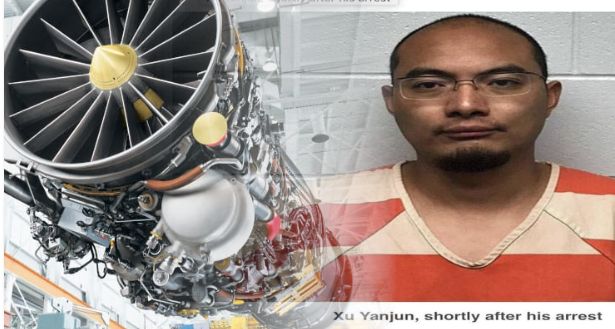
He had been working
with Chinese universities and institutions to identify and target specific
engineers with the secrets China needed, passing on the data to the government,
academia, and companies. His American lawyer declined to comment, but the
Chinese Foreign Ministry is reported as saying the case was a “pure
fabrication.”
In November
2021 Xu Yanjun was convicted
of economic espionage.
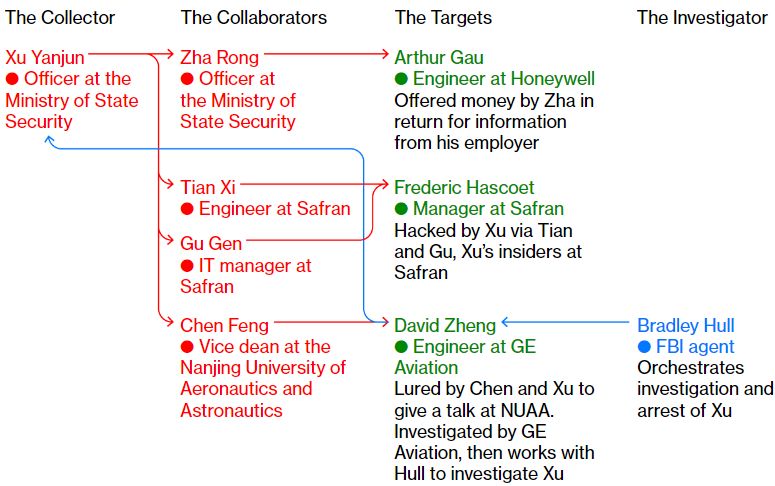
“From a perspective of
threat against United States national security and our interests, [the] Chinese
is number one by far,” says Bill Evanina (pictured
below), a former FBI official who is now director of the US National
Counterintelligence and Security Center which co-ordinates the defense of
America against foreign spies.
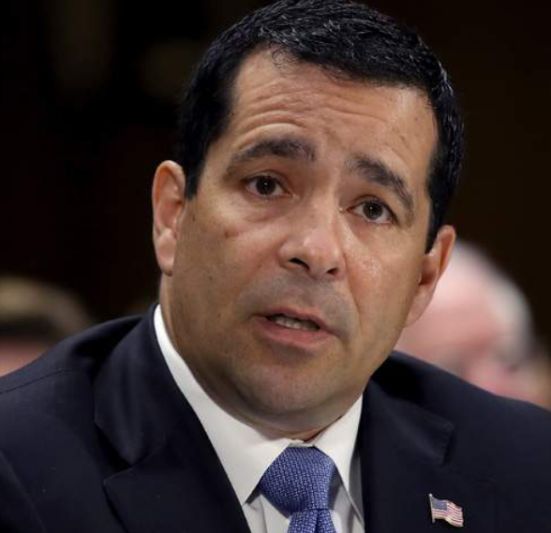
According to Bill Evanina, especially
US universities are a soft target for China's spies
The Way To The White House
Here,
the articulation of the ‘peaceful
rise’ concept marked the beginning of a phenomenally successful influence
operation orchestrated by the MSS through the China Reform Forum. The United
States dogmatic confidence in China’s political liberalization, coupled with
the MSS’s influence peddling, doomed Washington to failure in recognizing and
reacting to China’s political course. Yet this stunning success emerged from a
particularly tumultuous period of US-China relations around the turn of the
century.
China’s rise as a
global economic power and the accompanying increase in its international
political and security role has raised questions in the United States and
abroad about whether its emergence will be stabilizing or destabilizing. Zheng Bijian, the Chairman of the China Reform Forum, is the
principal proponent of the theory of “China’s peaceful rise,” which posits that
China can emerge as one of the world’s leading economies without threatening
the international system.
China Reform Forum
had been probing US politics for years, aided by numerous intelligence officers
stationed in DC and New York as diplomats and journalists. In the early days of
the Bush administration, the forum invited politically connected American China
scholars to Beijing, quizzing them on Washington intrigue: who was up for
promotion, who might be favorably disposed to China, and so on. The MSS was
slowly working its way closer to the White House.
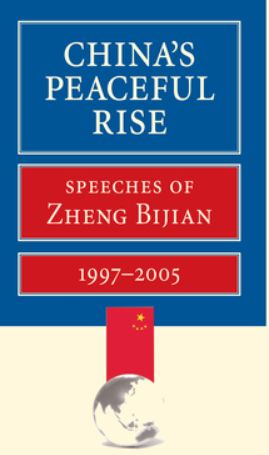
The MSS Moves Into Washington
The scene was set for
Zheng to lead the MSS’s political influence professionals into Washington.
Despite her strong
comments on China, ‘Condoleezza Rice was still one of the few options we had to
work on’, explained Li Junru, then a deputy director
of China Reform Forum. The scene was set for Zheng to lead the MSS’s political
influence professionals into Washington.
With an invitation
from two venerable DC think tanks, they busily worked their contacts to line up
meetings with key decision-makers.This task was made
easier by the fact that Zheng was recognised as a
leader of Communist Party chief Hu Jintao’s new task force on US-China relations.Tellingly, expert theoreticians and narrative
crafters like external propaganda official Zhao Qizheng
– not diplomats – formed the group’s core.1 This was an influence operation,
not a policymaking committee.
For both sides,
it was a chance to gauge the waters. In December 2002, the US State
Department’s head of policy planning, Richard Haass,
gave a speech just three days before Zheng’s team departed for the United
States.
Haass
attempted to lay out a ‘post-Cold War’ agenda for the relationship that would
make up for what he called the previous decade’s directionless ‘fits and
starts’. The speech was a defining document of what now feels like the distant
history of US–China relations. This new era would be defined by ‘tangible actions
to build a more cooperative US–China relationship’. Mere ‘engagement’, Haass argued, was not enough – America’s new Chinese
mission was to build concrete cooperation on key areas.
The Bush administration
also believed China could and should be integrated into its international
‘system of shared interests and values’. A core but shaky pillar underlying
this premonition was the belief that ‘prosperity will lead inexorably to
demands by Chinese citizens for greater inclusion in their political system’. Haass called for China to move towards political liberalisation and openness, but the coming years showed
that the US was willing to leave that up to the Party’s discretion. Haass, for his part, was emphatically opposed to
competition with China.2
Picture of Zheng Bijian with
Former U.S. President George Bush:
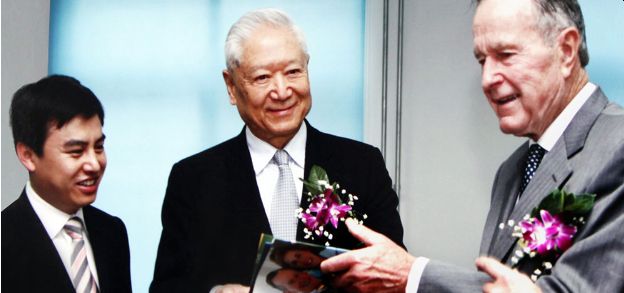
The MSS Collaborators
Zheng and his MSS
collaborators arrived that December as the first high-level delegates to study Haass’s proposal on the ground. Was this a ploy to distract
and undermine China, or could the Party embrace the benefits of US partnership
while dallying on the question of human rights and political change? For the
MSS, this was an opportunity to analyse the situation
in America as it honed and revised its influence operations, seeking to avert
attention from signs of the Party’s growing misdeeds and ambition.
They couldn’t have
gathered a better focus group to investigate and test their lines on as they
crafted what became the ‘theory of China’s peaceful rise’. The delegation
visited senior congresspeople and officials from the departments of state and
commerce. Half a dozen retired officials who continued to shape foreign policy
discussions, including Henry Kissinger and Brent Scowcroft, weren’t forgotten
either.
Condoleezza Rice and
Bush’s chief of staff were key parts of the agenda. The China Reform Forum team
sat down with Bush’s young national security advisor, effectively Bush’s top
foreign policy advisor alongside the secretary of state. According to the
Chinese side’s rather condescending account, Zheng and Rice got off to a cold
start. ‘Your qualifications aren’t enough to be the US national security
advisor,’ Zheng said. ‘You don’t understand China because you’ve never been to
China.’ Rice had in fact visited China before, but Zheng pressed the point. He
quizzed her on the essence of the Chinese Communist Party and laughed when she
claimed it was the ‘three represents’, Jiang Zemin’s recently introduced policy
emphasising the importance of the business sector.
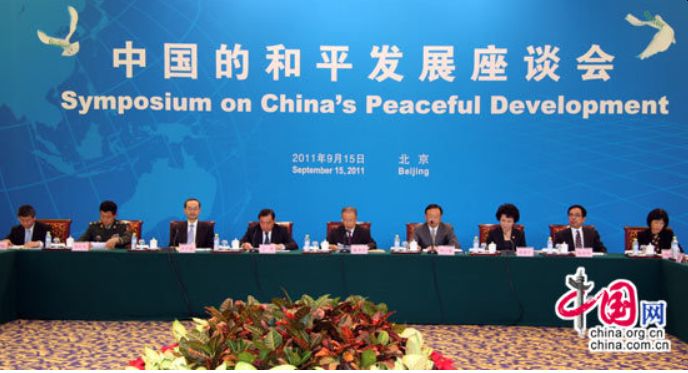
Zheng left Rice with
three gifts. First was volume three of the Selected Works of Deng Xiaoping,
which covers most of the 1980s (‘to tell her that our internal and external
policies aren’t tricks, that they’re open’). Second were the memoirs of Pu Yi,
China’s last emperor who was detained and re-educated as a gardener by the CCP
(to show China’s history of anti-imperialism, class struggle and humanism).
Finally, he gave Rice, an accomplished pianist, a copy of the Yellow River
Piano Concerto, hoping that the score would somehow showcase China’s ‘vibrant
culture and deep history’.
Zheng described how
his American counterparts often expressed concerns that China was on an
inexorable path to conflict with the United States, that it ‘will inevitably
become a potential threat to the United States. He rejoined that China would
forge a peaceful and groundbreaking path to development, relying on socialism
with Chinese characteristics. Spicing up the novelty of his approach, Zheng
said that his American interlocutors remarked they’d never considered the idea
before and told him it was ‘very deep’. He claimed that America’s foreign
policy giants – Kissinger, Brzezinski, and Scowcroft – were all swayed by and
in agreement with Zheng’s proposal. All he requested to take the idea further
was approval to focus research efforts on ‘peaceful rise’ and access to
platforms where he could promote it to international audiences, which is where
the Bo’ao Forum for Asia fits in.
More than anyone
else, Chinese scholars aimed at Zheng’s theory. Two professors from Beijing’s
Renmin University summarised the main critiques,
which centered on how the ‘Taiwan issue’ and America’s attitude towards China
undermine the idea that China can rise peacefully. For one, China’s Taiwan
policy officially reserves the right to use armed force to conquer Taiwan,
though dressed up in defensive language. The peaceful rise concept cannot limit
this ‘sacred right.’ Second goes the critique, America will try to constrain
China’s peaceful development. Both countries had their share of folks who
believed some sort of confrontation was inevitable.
Zheng Bijian Meets With
Former U.S. Secretary Of State Henry Kissinger:
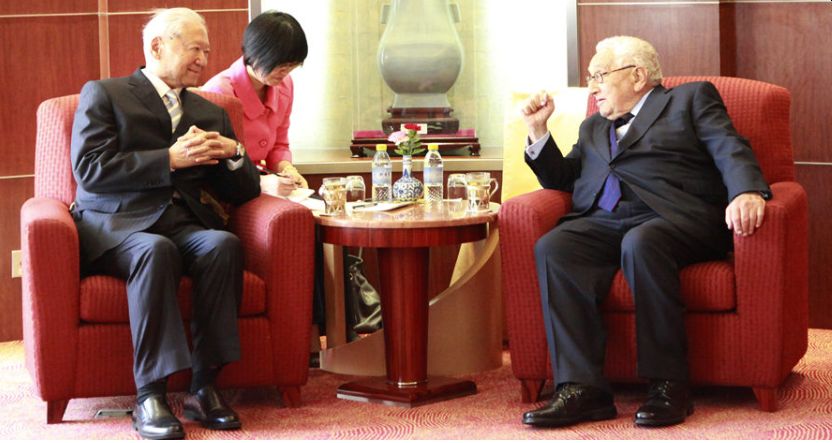
The peaceful rise theory
‘always had a kind of half threat’, an American China scholar who heard Zheng
speak recalled. ‘It was like, “China will rise peacefully unless …”
The theory’s
challenges and contradictions allow ill-informed observers to interpret it
differently and map it to their aspirations for China. This flexibility allowed
‘peaceful rise’ to catch on as an unfalsifiable cultural meme that could be
conveniently adjusted and elaborated on. It took on a life of its own,
outlasting its official endorsement.
Yet Zheng's global
influence is undeniable. No less than Henry Kissinger, the giant of American
foreign policy who was central to opening US-China relations, praised Zheng in
his bestselling 2011 book On China. Kissinger, one of Zheng’s frequent interlocutors,
elevated the peaceful rise narrative to a statement of Chinese government
intentions. The fact that Zheng’s proposal dropped out of official usage as
quickly as it appeared, and for that matter, was never about policy anyway,
gets left out.4
More so than any
other Chinese think tank, the MSS’s China Reform Forum could lure in foreign
friends from the highest levels of politics and government. While its promises
of ‘peaceful rise’ proved to be a lie. Yet a spectacular new landscape unfolded
before the MSS once it learned to wield these powers. It could now orchestrate
more closed-door discussions (like and deals with world-class foreign
scholars and policymakers. These private meetings opened up new possibilities
for influence operations, the kind China’s spies once only dreamt of.
1. The Foreign
Ministry’s Li Zhaoxing and General Wang Zaixi of the Taiwan Affairs Office were also named as
members of the group, although apparently with lower status. James Kynge, ‘Apparatchik who may raise the party’s clout’,
Financial Times, 15 March 2002.
2. Richard H. Haass, ‘China and the future of US-China relations’, US
Department of State, 5 December 2002,
web.archive.org/web/20090205172433/https://2001-2009.state.gov/s/p/rem/15687.htm
3. China Reform Forum
[website homepage], archived 8 June 2003,
web.archive.org/web/20030608230032/www.crf.org.cn/index.htm
4. Henry Kissinger,
On China, Penguin Books, New York, 2011, p. 449.
For updates click hompage here